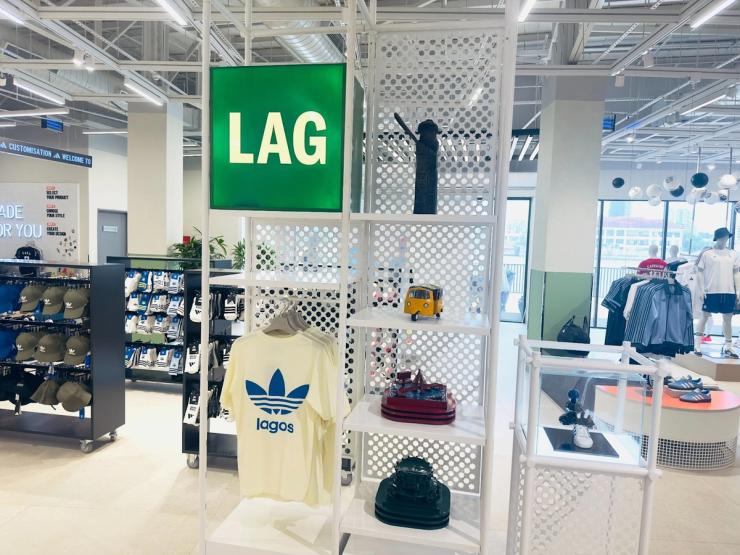The Scene
Sportswear giant Adidas is expanding in Nigeria, its largest West African market, the latest lifestyle brand to bet on the country’s affluent class as the economy shows cautious signs of recovery.
The German company’s largest store in the subregion, which opened this month, targets Nigerians whose fortunes have held steady despite a series of government policies that have contributed to an economic slowdown.
A number of consumer goods multinationals have quit Nigeria in recent years because skyrocketing inflation, triggered by the devaluation of the naira, has curtailed the spending of most shoppers. Those economic woes have squeezed the working middle class, but people paid in dollars or key lucrative sectors have emerged relatively unscathed. As a result, Nigeria has a sizable number of affluent shoppers relative to other African countries, despite them making up only a small proportion of the country’s consumer base. And, with the nation’s population growth far outstripping that seen in advanced economies in other parts of the world, Nigeria remains an attractive growth market.
“Nigerians have the purchasing power but people underestimate it,” Vincent Kangni, the Lekki store’s manager, told Semafor. The store’s ambition is for the types of customers who typically travel to Dubai or Paris for quality retail services to experience the same at home, he said, while spending in their own currency and without the hassle of shipping.
In this article:
Know More
Adidas first set up franchise stores in Nigeria four years ago, opening two more this year and growing its footprint to more than half a dozen locations. The latest rollout was a 1,400 square meter property in the upmarket Lekki district in Lagos, built on a grassy playground where children once flew kites close to the city’s lagoon.
International sports brands, with their stock of $150 jerseys and $300 sports shoes, are not the only companies to have targeted the wallets of affluent Nigerians in recent years. In 2023, the high-end Danish electronics maker Bang & Olufsen opened its second Nigerian store in Lagos, eight years after it launched in Abuja. Last year, British furniture maker Timothy Oulton also debuted in Nigeria, confident that its handmade leatherworks — some of which go for $6,000 a piece — would find a place in Lagos homes.
The most visible international high-end players are the multinational hotels, which cater to those Nigerians wealthy enough to spend on luxury services. Major US chains such as Hilton, Radisson, and Marriott have planned more upmarket hotel and resort projects in Nigeria than anywhere else in sub-Saharan Africa, according to the hospitality research firm W Hospitality Group. Around 7,000 hotel rooms are in the pipeline for development in Nigeria as of this year, it said.
Alexander’s view
The arrival of the new Adidas store is emblematic of the potential foreign firms see in affluent Nigerians. The appeal of Nigeria for many businesses lies in its massive population — at 220 million, it is the largest in Africa.
Nigeria has the third-highest number of high net worth individuals in Africa, with only South Africa and Egypt boasting more. The number of Nigerian-dollar millionaires may have shrunk 45% in the decade up to 2023, but there were still 8,200 of them at the most recent count by Henley & Partners, a London-based consultancy.
These truths co-exist with realities that have garnered more headlines in recent years — nearly a third of Nigerians live on less than $2 a day, with the World Bank estimating that nearly 50% of people in the country lived in poverty last year.
Despite the hardship experienced by many, the rapid growth of digital commerce highlights a dynamic, busy economy. The value of instant electronic payment transactions grew 60% year-on-year as of last December, according to data by NIBSS, a central switch operator co-owned by the central bank and commercial banks.
The upshot, according to the more than half a dozen shoppers I spoke with at Adidas’ new Lagos spot, is that there will always be Nigerians ready to consume anything packaged to please. “We are consumers that like to make statements,” Abisola Williams, a human resources associate at a national bank, told me.
Room for Disagreement
Nigeria’s nightlife has lost its raucous quality, as seen during last year’s subdued ‘Detty December’ in Lagos — usually a period of lively parties known for drawing the diaspora home. Economic reforms aimed at retooling the country away from petrol subsidies and irregular dollar exchange rates “sapped the energy from Lagos’s party spots,” the Financial Times reported. Patrons who typically spent liberally on nights out became more calculating to avoid surprises.
Notable
- Premium brands that fail in Nigeria struggle to fit their messaging to Nigerians’ “pragmatic premium” behavior, a column in the Lagos-based publication BusinessDay argued in February.


